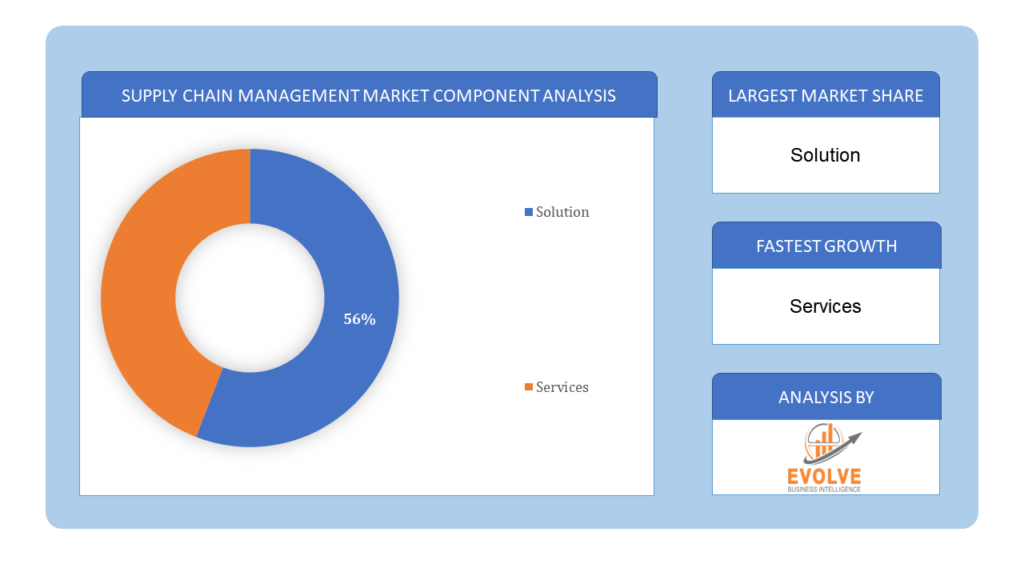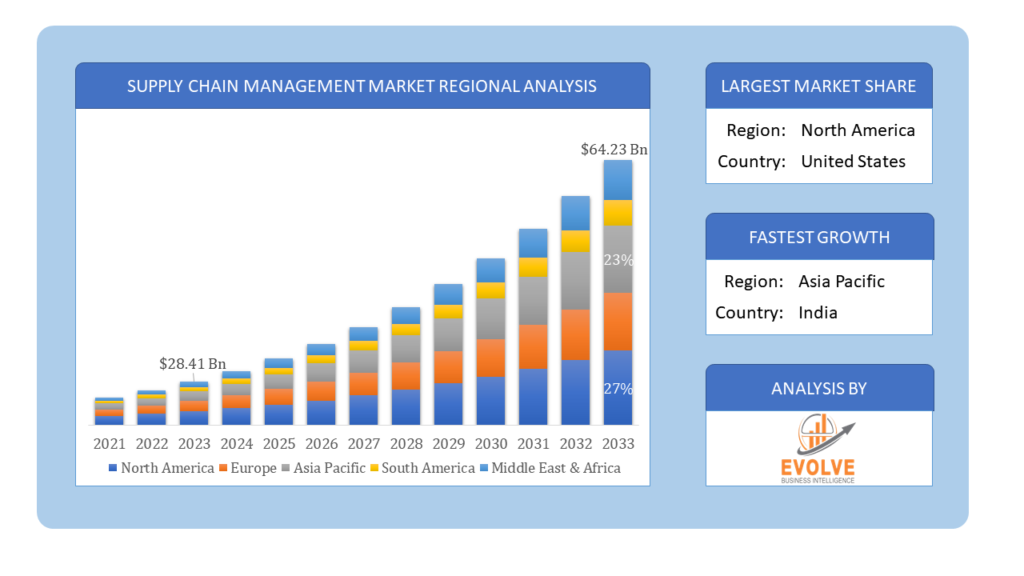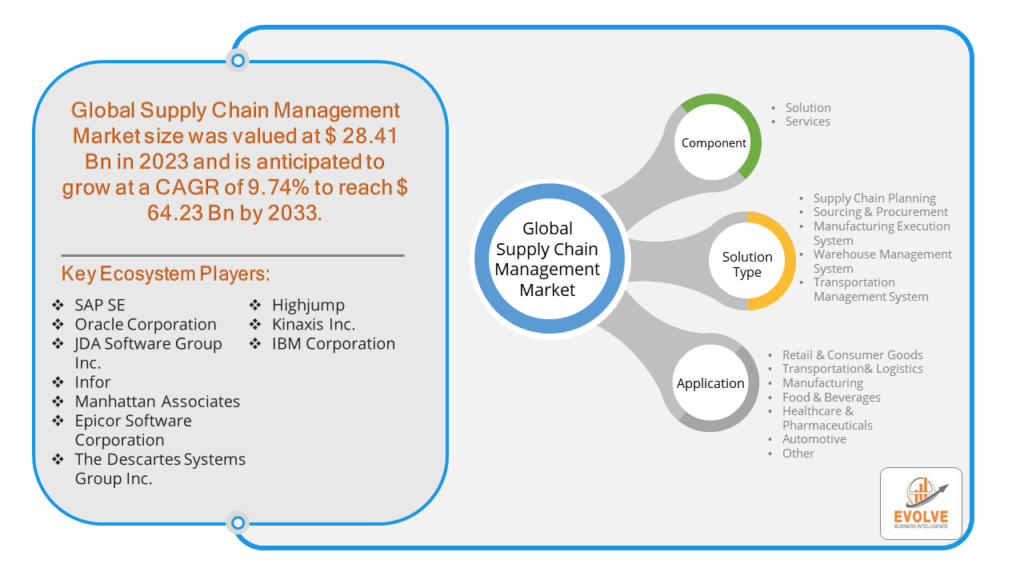Supply Chain Management Market Overview
The Supply Chain Management Market Size is expected to reach USD 64.23 Billion by 2033. The Supply Chain Management Market industry size accounted for USD 28.41 Billion in 2023 and is expected to expand at a compound annual growth rate (CAGR) of 9.74% from 2023 to 2033. The Supply Chain Management (SCM) Market encompasses all the tools, technologies, and services used to manage and optimize the flow of goods, information, and finances as products move from suppliers to manufacturers to wholesalers to retailers, and finally to consumers. This market includes software solutions like Enterprise Resource Planning (ERP) systems, Transportation Management Systems (TMS), Warehouse Management Systems (WMS), and other technologies that aid in planning, execution, and monitoring of supply chain activities.
The SCM market is driven by the need for businesses to improve operational efficiency, reduce costs, enhance customer satisfaction, and respond swiftly to market changes. It is also influenced by trends like globalization, e-commerce growth, and the increasing complexity of supply chains.
Global Supply Chain Management Market Synopsis
The COVID-19 pandemic had a significant impact on the Supply Chain Management (SCM) market. The pandemic caused major disruptions in global supply chains due to factory shutdowns, transportation restrictions, and labour shortages. This led to delays, shortages of raw materials and finished goods, and increased costs. Restrictions on transportation and border closures created logistical bottlenecks. Ports, shipping, and trucking faced significant delays, complicating the movement of goods. The pandemic highlighted the need for digital supply chain solutions. Companies accelerated the adoption of technologies like cloud-based SCM software, AI, IoT, and blockchain to enhance visibility, agility, and resilience. The surge in online shopping during the pandemic drove demand for efficient supply chain solutions tailored to e-commerce. This included advanced warehouse management systems, last-mile delivery optimization, and real-time tracking systems. The pandemic fostered greater collaboration between supply chain partners. Enhanced data sharing and communication tools became essential for managing disruptions and ensuring smooth operations. The SCM market will see sustained investment in advanced technologies to enable better demand forecasting, inventory management, and overall supply chain optimization.
Supply Chain Management Market Dynamics
The major factors that have impacted the growth of Supply Chain Management Market are as follows:
Drivers:
Ø Technological Advancements
These technologies enhance demand forecasting, inventory management, and predictive maintenance by analyzing large datasets and providing actionable insights. IoT devices enable real-time tracking and monitoring of goods, improving visibility and traceability throughout the supply chain. Blockchain technology ensures secure and transparent transactions, reducing fraud and enhancing trust among supply chain partners. The expansion of global trade has increased the complexity of supply chains, driving demand for sophisticated SCM solutions to manage cross-border logistics and regulatory compliance. The rapid growth of e-commerce has heightened the need for efficient and responsive supply chain management to meet consumer expectations for fast and reliable delivery.
Restraint:
- Perception of High Implementation Costs
Implementing advanced SCM solutions often requires significant upfront costs for software, hardware, and infrastructure. Small and medium-sized enterprises (SMEs) may find it challenging to afford these investments. Ongoing costs for maintaining and upgrading SCM systems can be substantial, deterring companies from adopting or fully utilizing these technologies. The increasing use of digital technologies in supply chains raises the risk of cyberattacks and data breaches, which can compromise sensitive information and disrupt operations. Companies may become overly dependent on specific SCM solution providers, leading to potential risks if the vendor faces financial difficulties, changes pricing models, or discontinues support for certain products.
Opportunity:
⮚ Digital Transformation
The increasing adoption of AI, ML, IoT, blockchain, and robotics presents significant opportunities for optimizing supply chain operations. These technologies can improve demand forecasting, inventory management, and overall supply chain visibility. The shift towards cloud-based SCM solutions offers scalability, flexibility, and cost-efficiency, enabling businesses to manage their supply chains more effectively and from any location. The rise of omnichannel retailing requires integrated SCM solutions to provide a seamless shopping experience across multiple channels, including online, in-store, and mobile. Increasing awareness of environmental issues is pushing companies to adopt sustainable supply chain practices, such as reducing carbon footprints, optimizing resource use, and ensuring ethical sourcing. The transition towards a circular economy, which emphasizes recycling and reuse of materials, creates opportunities for SCM solutions that support these practices and enhance resource efficiency.
Supply Chain Management Market Segment Overview
By Component
 Based on Component, the market is segmented based on Solution and Services. The dominating component is solution. A wide range of software and technological solutions, including as inventory management, demand forecasting, and logistics, are included in this category. These solutions are intended to optimise and streamline different areas of supply chain activities. Services are the component that is increasing the quickest at the same time. The need for services like installation, support, and advising is driven by the need for specialised knowledge and the increasing complexity of supply chain networks.
Based on Component, the market is segmented based on Solution and Services. The dominating component is solution. A wide range of software and technological solutions, including as inventory management, demand forecasting, and logistics, are included in this category. These solutions are intended to optimise and streamline different areas of supply chain activities. Services are the component that is increasing the quickest at the same time. The need for services like installation, support, and advising is driven by the need for specialised knowledge and the increasing complexity of supply chain networks.
By Solution Type
Based on Solution Type, the market segment has been divided into the Supply Chain Planning, Sourcing & Procurement, Manufacturing Execution System, Warehouse Management System and Transportation Management System. The dominating solution type is warehouse management system. WMS is essential to optimising order fulfilment, inventory monitoring, and general logistics management in warehouse operations. WMS is a leading solution that helps organisations increases the effectiveness of their supply chains and customer satisfaction due to the growing emphasis on efficient warehouse operations and the requirement for real-time inventory visibility. Transportation Management System is the solution type that is expanding the fastest at the same time. The need for TMS is driven by the increasing complexity of global supply chains and the emphasis on efficient and timely transportation solutions.
By Application
Based on Application, the market segment has been divided into the Retail & Consumer Goods, Transportation& Logistics, Manufacturing, Food & Beverages, Healthcare & Pharmaceuticals, Automotive and Other.
Global Supply Chain Management Market Regional Analysis
Based on region, the global Supply Chain Management Market has been divided into North America, Europe, Asia-Pacific, the Middle East & Africa, and Latin America. North America is projected to dominate the use of the Supply Chain Management Market followed by the Asia-Pacific and Europe regions.
 Supply Chain Management North America Market
Supply Chain Management North America Market
North America holds a dominant position in the Supply Chain Management Market. North America, particularly the United States and Canada, has a mature SCM market with high adoption rates of advanced technologies such as AI, ML, IoT, and blockchain. Strong presence of key SCM solution providers and extensive use of cloud-based SCM platforms. Advanced technological infrastructure and high investment in R&D and Strong e-commerce growth driving the need for efficient supply chain solutions.
Supply Chain Management Asia-Pacific Market
The Asia-Pacific region has indeed emerged as the fastest-growing market for the Supply Chain Management Market industry. This region currently holds the biggest market share due to the large automotive manufacturing base in countries like China, Japan, South Korea, and India. These countries are experiencing rapid growth in car production and are increasingly integrating advanced technologies into their vehicles, driving demand for automotive ethernet solutions.
Competitive Landscape
The global Supply Chain Management Market is highly competitive, with numerous players offering a wide range of software solutions. The competitive landscape is characterized by the presence of established companies, as well as emerging startups and niche players. To increase their market position and attract a wide consumer base, the businesses are employing various strategies, such as product launches, and strategic alliances.
Prominent Players:
- SAP SE
- Oracle Corporation
- JDA Software Group Inc.
- Infor
- Manhattan Associates
- Epicor Software Corporation
- The Descartes Systems Group Inc.
- Highjump
- Kinaxis Inc.
- IBM Corporation
Scope of the Report
Global Supply Chain Management Market, by Component
- Solution
- Services
Global Supply Chain Management Market, by Solution Type
- Supply Chain Planning
- Sourcing & Procurement
- Manufacturing Execution System
- Warehouse Management System
- Transportation Management System
Global Supply Chain Management Market, by Application
- Retail & Consumer Goods
- Transportation& Logistics
- Manufacturing
- Food & Beverages
- Healthcare & Pharmaceuticals
- Automotive
- Other
Global Supply Chain Management Market, by Region
- North America
- US
- Canada
- Mexico
- Europe
- UK
- Germany
- France
- Italy
- Spain
- Benelux
- Nordic
- Rest of Europe
- Asia Pacific
- China
- Japan
- South Korea
- Indonesia
- Austalia
- Malaysia
- India
- Rest of Asia Pacific
- South America
- Brazil
- Argentina
- Rest of South America
- Middle East & Africa
- Saudi Arabia
- UAE
- Egypt
- South Africa
- Rest of Middle East & Africa
| Parameters | Indicators |
|---|---|
| Market Size | 2033: $64.23 Billion/strong> |
| CAGR | 9.74% CAGR (2023-2033) |
| Base year | 2022 |
| Forecast Period | 2023-2033 |
| Historical Data | 2021 |
| Report Coverage | Revenue Forecast, Competitive Landscape, Growth Factors, and Trends |
| Key Segmentations | Component, Solution Type, Application |
| Geographies Covered | North America, Europe, Asia-Pacific, Latin America, Middle East, Africa |
| Key Vendors | SAP SE, Oracle Corporation, JDA Software Group Inc., Infor, Manhattan Associates, Epicor Software Corporation, The Descartes Systems Group Inc., Highjump, Kinaxis Inc. and IBM Corporation |
| Key Market Opportunities | • Digital Transformation • Sustainability Initiatives |
| Key Market Drivers | • Technological Advancements • E-commerce Growth |
REPORT CONTENT BRIEF:
- High-level analysis of the current and future Supply Chain Management Market trends and opportunities
- Detailed analysis of current market drivers, restraining factors, and opportunities in the future
- Supply Chain Management Market historical market size for the year 2021, and forecast from 2023 to 2033
- Supply Chain Management Market share analysis at each product level
- Competitor analysis with detailed insight into its product segment, Government & Defense strength, and strategies adopted.
- Identifies key strategies adopted including product launches and developments, mergers and acquisitions, joint ventures, collaborations, and partnerships as well as funding taken and investment done, among others.
- To identify and understand the various factors involved in the global Supply Chain Management Market affected by the pandemic
- To provide a detailed insight into the major companies operating in the market. The profiling will include the Government & Defense health of the company’s past 2-3 years with segmental and regional revenue breakup, product offering, recent developments, SWOT analysis, and key strategies.





